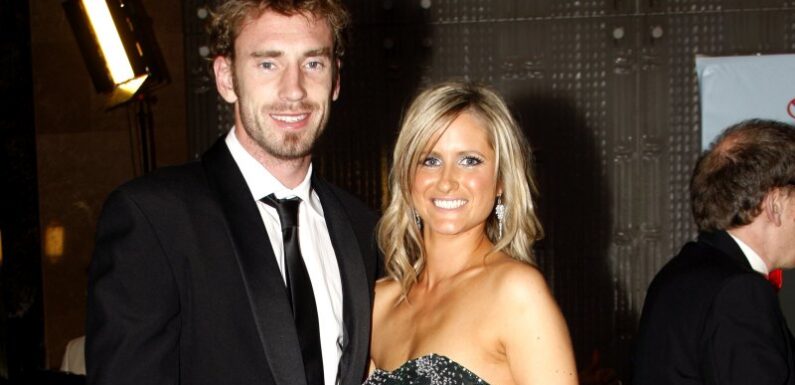
Save articles for later
Add articles to your saved list and come back to them any time.
Children should be limited to low- or no-contact sport and a comprehensive history of brain injuries included on patient medical records, the peak body of Australian pathologists says as it urges the federal government to adopt recommendations of a Senate inquiry into sports-related brain trauma.
Alarmed by the damage they have discovered in the brains of former athletes, the Royal College of Pathologists of Australasia will on Wednesday release a position statement on chronic traumatic encephalopathy (CTE) and its link to repetitive head trauma and concussion.
Associate Professor Michael Buckland (right) found the worst case of CTE he had ever seen in the brain of Shane Tuck, former Richmond player and the brother of Renee Tuck (left).Credit: James Brickwood
The neurodegenerative disease can only be diagnosed after death through an autopsy, and has been found in the brains of former sportspeople including AFL great Graham “Polly” Farmer, NRL figure Paul Green and AFLW player Heather Anderson.
Australian Sports Brain Bank founding director Associate Professor Michael Buckland said this was the first time a medical college in Australia has officially outlined a position on the causal link between repeated head trauma and CTE. It follows a Senate inquiry that recommended the government play a stronger role in monitoring and regulating head trauma in sport.
“We’ve got more amateur CTE cases than professional [sportspeople] now, and we’ve had the youngest case of someone who was 20,” he said. “We have no idea how big the problem is. We haven’t yet touched the bottom.”
After former AFL player Shane Tuck died by suicide in 2020, Buckland examined his brain and discovered the most severe case he had seen since the launch of the brain bank in 2018.
His sister, Renee Tuck, said her 38-year-old brother’s brain had deteriorated to the point where he was hearing constant voices in his head that made every day a living hell.
“Shane was the biggest, strongest, mentally strong bloke that I’ve ever known, and he ended up killing himself because his brain was just toasted,” she said. “I don’t want anyone to ever have to go through that.”
Former AFL player Shane Tuck, pictured here in 2013. Credit: Sebastian Costanzo
Among the college’s recommendations is restricting children under 14 to low- or no-contact versions of sports, which Buckland said is based on evidence a player’s risk of developing CTE is greater the longer they play contact sport.
The college is also pushing for head trauma and sporting history to be included in routine medical records taken by GPs, neurologists, psychiatrists and other specialists.
This will help doctors identify patients who may be at risk of the disease and help families find answers for the declining mental health or suicide of a loved one, said Associate Professor Linda Iles, the head of forensic pathology at the Victorian Institute for Forensic Medicine.
“When you’re speaking to families at the worst moment in their life, proactively probing them about something that is very niche [CTE] becomes really challenging,” she said. “That’s why public awareness is really important.”
Amanda and Paul Green with son Jed and daughter Emerson.
Amanda Green, whose husband Paul’s death by suicide shocked the NRL community last year, said that despite her family’s involvement in the elite level of the game over more than two decades, she had no idea of the seriousness of CTE or its symptoms.
“That’s not OK,” she said.
Green said her husband’s sudden death, and subsequent diagnosis with CTE, had made her think twice about her son Jed and daughter Emerson’s involvement in contact sport, but that was ultimately a decision every family needed to make for itself.
“Both of my kids love sport, and it’s part of our society and how they socialise,” she said. “For me, it’s all about supporting research and understanding this disease, so experts can make those decisions about what’s the safest environment for our kids to play in.”
If you or anyone you know needs support, call Lifeline on 131 114 or Beyond Blue on 1300 224 636.
Start the day with a summary of the day’s most important and interesting stories, analysis and insights. Sign up for our Morning Edition newsletter.
Most Viewed in National
From our partners
Source: Read Full Article


